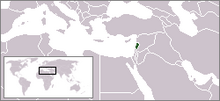LGBT rights in Lebanon
|
LGBT rights in Lebanon |
|
|---|---|

|
|
| Same-sex sexual activity legal? | Legal |
| Gender identity/expression | Yes, transgender people may change legal gender following surgery |
| Discrimination protections | No |
| Family rights | |
| Recognition of relationships |
No |
| Adoption | No |
Lesbian, gay, bisexual, and transgender (LGBT) persons living in Lebanon may face difficulties not experienced by non-LGBT residents, however they are considerably more free than in other parts of the Arabic-speaking community. Various courts have ruled that Article 534 of the Lebanese Penal Code, which prohibits having sexual relations that "contradict the laws of nature", should not be used to arrest LGBT people making homosexuality de facto legal.
A poll done by the Pew Research Center in 2007 showed that 79% of Lebanese believed "homosexuality should be rejected by society", as opposed to 18% who believed "homosexuality should be accepted by society". But recently, there was an increase in the acceptance of LGBT people by the society, particularly after the Lebanese National Center for Psychiatry declassified the non-heterosexual sexual orientations as mental disorders, a milestone in the Arabic-speaking world.
Article 534 of the Lebanese Penal Code prohibits having sexual relations that are "contradicting the laws of nature", which is punishable by up to a year in prison. As a practical matter, enforcement of the law had been varied and often occurred through occasional police arrests. In 2002, the police broke into a woman's house after her mother claimed that her daughter had stolen some money and jewelry. Upon entering the house, the police found the woman having sexual relations with another woman and charged them both with the crime of sodomy.
In 2007, Judge Mounir Suleiman called a halt to a criminal investigation of two men arrested under Article 534. He disputed that homosexuality was "contrary to the rules of nature" and noted that what was seen as "unnatural" reflected the social mores of the time.
On 11 December 2009, the Lebanon-based LGBT organization Helem launched a report that would target the legal situation of homosexuals in the Middle East and North Africa. In 2011, a Lebanese judge in Batroun ruled against the use of Article 534 to prosecute homosexuals.
In 2012, then Justice Minister Shakib Qortbawi weighed in on the use of anal examinations on men accused of same-sex conduct, issuing a statement calling for an end to this practice.
In April 2013, the Mayor of Dekwaneh, a suburb north of Beirut, ordered security forces to raid and shut down a gay-friendly nightclub. Several club-goers were arrested and forced to undress in the municipal headquarters, where they were then photographed naked. This operation was condemned by numerous gay rights activists. Lebanon's Interior Minister of the Interim Government, Marwan Charbel, supported the mayor of Dekwaneh saying, ""Lebanon is opposed to homosexuality, and according to Lebanese law it is a criminal offense."
...
Wikipedia
